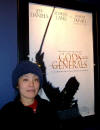 |
Hiromi brandishes chop sticks... |
 |
 |
Across the street from my lodge... Bill Gates on the front page of the Seattle Times... |




 |
 |
 |
Looking east from downtown Bellevue toward the snowy Cascade Mountains, and south toward Mt. Rainier... |









 |
We attended Gods and Generals at Redmond Town Center... an extraordinarily fine movie... |






By Michael Medved
February 21, 2003
http://www.wnd.com/2003/02/17395
Dear Ted Turner,
At this advanced stage of your long and complicated career you have finally crossed the line – making a contribution to your country and its culture so unequivocally positive and powerful that every American, regardless of political perspective, owes you a debt of gratitude.
No matter how one feels about your creation of CNN, your donation of a billion dollars to the UN, your marriage to Jane Fonda, your operation of the Atlanta Braves, your divorce from Jane Fonda, your dismissal of Christianity as “a religion for losers,” your bison ranching, your yachting, or your fanatical feud with Rupert Murdoch, you have now performed a massive good deed that should provoke universal appreciation.
Not that “Gods and Generals” – produced due to your singular determination and generosity – constitutes a perfect film; many commentators, especially among your politically correct pals, will no doubt find fault with it for a portrayal of the War Between the States that aims for truth rather than trendiness. Nevertheless, your personal investment of some $80 million in a project of such audacious ambition has resulted in a major movie miracle. I’ve been reviewing movies for 23 years now (having started at CNN, in fact) and I’ve never before sat spellbound for nearly four hours (the film runs more than three hours and 40 minutes, with an intermission) wishing, at the end, that this heroic movie had gone on even longer.
Despite the epic scale of this effort, director-writer Ron Maxwell reached the right decision in making no attempt for comprehensive coverage of the period he illuminates. The movie begins in April, 1861, and concludes 25 months later, making no reference to epic battles like Antietam or the Peninsula Campaign, or to important personalities like McClellan, Winfield Scott, Halleck or Fremont. Even though Maxwell focuses most of his attention on the single fascinating figure of “Stonewall” Jackson, he never portrays that general’s most astonishing triumph – the breathtakingly brilliant Shenandoah Valley Campaign in the Spring of 1862, still studied today as an example of inspired leadership and masterful tactics. Maxwell chooses to concentrate on the general’s human qualities rather than his undeniable military genius, and the result is a film that should appeal to women as much as men, to history fanatics as well as those who don’t know the difference between Bull Run and Valley Forge.
Stephen Lang plays General Jackson with such startling authority and vitality that if there is any justice at all in Hollywood (a dubious proposition), he will receive a Best Actor Oscar nomination next year. The amazing element in this utterly riveting characterization is its balance and complexity: Lang’s Jackson is simultaneously fierce and tender, spiritual and practical, petty and magnanimous, eccentric, implacable and incomparably charismatic. The physical resemblance to the historic Stonewall is uncanny, even eerie – complete with the blazing blue eyes that led his men to nickname him “Old Blue Light.”
Robert Duvall similarly shines as Robert E. Lee, bringing to crackling life the dignity, poetry and ruthless edge of this legendary commander. Duvall takes over the role from Martin Sheen (of all people) who proved adequate but uninspired in Ron Maxwell’s previous battlefield spectacular, “Gettysburg” (1993). Sheen’s Lee seemed dreamy, almost effete, and much too kindly; Duvall’s “Marse Robert” comes across (accurately) as an altogether more formidable customer.
In every way, “Gods and Generals” shows quantum improvements over “Gettysburg” – reflecting the vastly larger budget which your commitment made possible, Mr. Turner. The false beards and over-fed re-enactors that proved seriously distracting last time have been replaced by impeccable art direction, costumes, make-up and sets. The result, with the sweeping depiction of three crucial battles (First Bull Run, Fredricksburg and Chancellorsville, all filmed on the actual battlefields), ranks with “Alexander Nevsky,” the Soviet “War and Peace,” and “Saving Private Ryan” in terms of thrilling immediacy. One particularly moving sequence involves Meagher’s Irish regiment charging for the Union up Marye’s Heights at Fredericksburg, only to run directly into a Confederate Irish regiment, greeting them with recognition, tears, cheers, and deadly, withering fire.
With its emphasis on Jackson, including his moving friendship with a 5-year-old-girl during the Christmas season break in the fighting in 1862, “Gods and Generals” will undoubtedly draw criticism for its sympathetic treatment of the Confederate cause. In fact, Maxwell’s four hours of cinema provide a richer understanding of Southern motivation and passions than Ken Burns ever did in his hours and hours of gripping documentary on PBS. Looking down at the town of Fredericksburg, Virginia, just before the battle, Maxwell provides a stunningly effective speech for Robert E. Lee, as he recalls that he met his wife in that very village. “It’s something these Yankees do not understand,” he says, “will never understand. Rivers, hills, valleys, fields, even towns. To those people they’re just markings on a map from the war office in Washington. To us, they’re birthplaces and burial grounds, they’re battlefields where our ancestors fought. They’re places where we learned to walk, to talk, to pray. …They’re the incarnation of all our memories and all that we love.”
Maxwell treats his Union characters with less love, even while making clear their moral superiority on the issue of slavery.
Jeff Daniels returns to play Joshua Lawrence Chamberlain, the Maine college professor who became one of the major heroes at Gettysburg. Though the events of “Gods and Generals” precede the struggle in “Gettysburg,” Jeff Daniels looks unmistakably, distractingly older this time – showing the passage of 10 years. Maxwell also gives him a big moment before the Federal charge at Fredericksburg in which he recites the timeless words of Julius Caesar to inspire his men. The historical Chamberlain might well have delivered such a speech, but the hammy, lengthy, Latinate, declamation fizzles on screen. The heavy, intrusive and occasionally lumpish musical score by Randy Edelman and John Frizzell works poorly for this sequence, and other key moments in the movie.
Nevertheless, “Gods and Generals” inflames the imagination and inspires the soul – never more than in its frank, friendly treatment of the deep religiosity of men on both sides. The compassionate re-creation of so many vivid, decent characters never apologizes the paradox that soldiers in both blue and gray remained convinced that they served the Almighty’s will in battle; Maxwell allows us to believe that both sides may have been right.
Small moments provide some of the movie’s richest gifts: with Jackson and other officers singing “Silent Night” at a Christmas party while Stonewall yearns to see the newborn daughter he has never met; a Rebel and a Yankee walking on stones to the middle of a river, to trade tobacco for coffee and to pass a few peaceful moments; Joshua Lawrence Chamberlain explaining to his distraught wife (superbly played by Mira Sorvino) why he feels compelled to risk his life far from home; Lee declining to visit the wounded, dying Jackson, as if this refusal will force his indispensable lieutenant to a miraculous recovery.
There’s also a fine moment, Mr. Turner, when your smiling face appears for a few seconds along with other Confederate officers listening to a spirited rendition of the music hall favorite, “The Bonny Blue Flag.”
“We are a band of brothers, and native to the soil,” sing these sons of the South, and that sense of regional pride, loyalty to hearth and home, permeates this remarkable and richly rewarding movie.
Even those who have criticized you in the past, Mr. Turner, should recognize that with this film you’ve raised your own Bonny Blue Flag and challenged other Americans of wealth and influence to follow your example. Focus groups and market studies would have tried to discourage you from investing $80 million in a strikingly intelligent four-hour spectacle that never stoops to score cheap political points or conform to current fashion by showing the Confederates as redneck Nazis, or providing a one-dimensional focus on slavery as the only issue in the war.
Any consumers of pop culture who long for more ambition and substance in American entertainment must rush to see this movie; in fact, to show support for bold new directions in cinema, you should see it several times. If this film succeeds beyond expectations it will send powerful messages to the gatekeepers in show business, encouraging a new emphasis on juicy, accurate historical and, yes, religious content.
This movie, in fact, could amount to a turning of the tide in the ongoing battle to enrich and uplift the culture. If that occurs, we must thank God and two generals: Ron Maxwell, and that unlikely leader for the cause of the angels, Ted Turner. As in any great battle, deliverance can come from an unexpected source.
Thank you, Mr. Turner, and I wish you great success with your courageous effort.
FOUR STARS. Rated PG-13, for some intense battlefield violence.